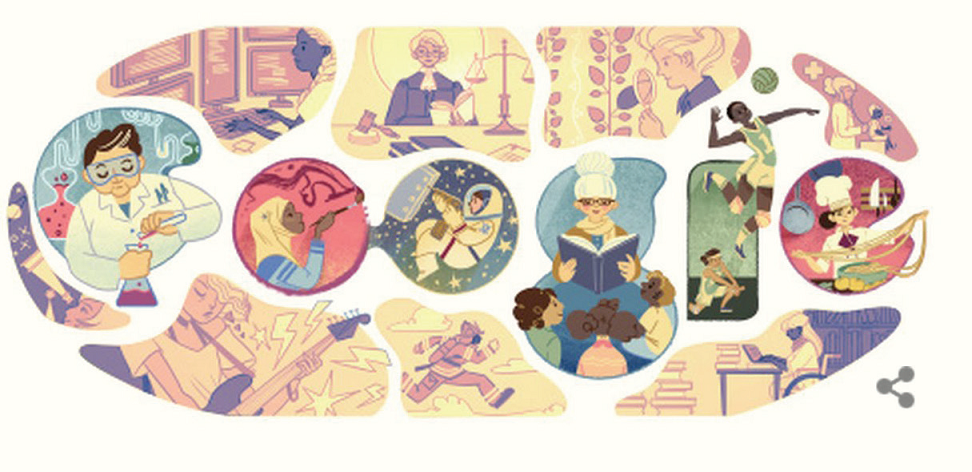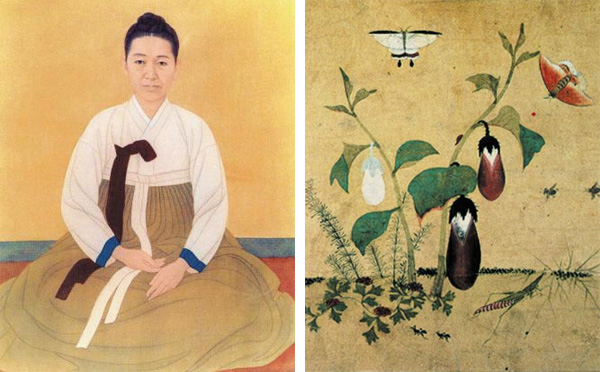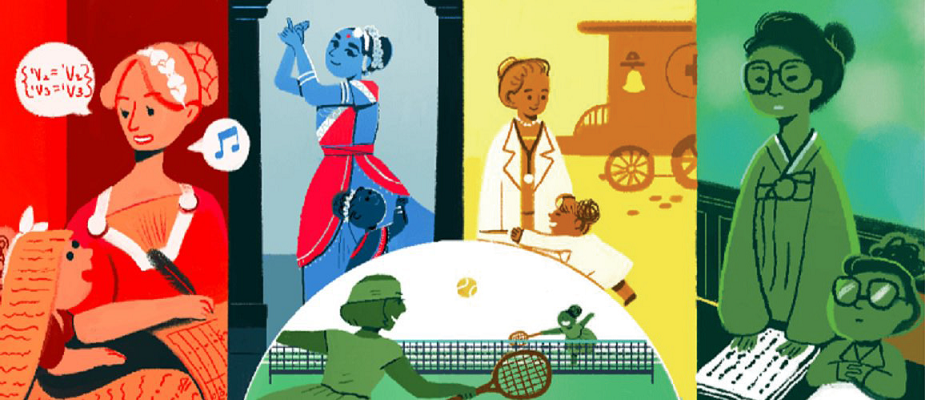
Have you ever heard the song lyrics ‘on beautiful land, our founding father Dangun settled to establish Korea’? These lyrics are from the song ‘100 Great People Who Brought Honor to Korea’, but have you ever stopped to wonder how many of those 100 great people mentioned in the song are women? Surprisingly, only five women: Sin Saimdang, Nongae, Hwang Jini, Yu Gwansun and Sim Sunae are mentioned in the song. Does Korea only have 5 great female role models? If we are to consider the song, Korea would only have 4 “real” great female figures because one of them in the song is fictional. Not just in Korea, Can you think of any other great females throughout the world in history? You might think about Queen Sunduk, Hur Chohui, Joan of Arc, Queen Elizabeth Ⅰ, Florence Nightingale, Madame Curie, and Helen Keller. However, too soon, names start to elude you. Indeed, naming 100 global great women is difficult, so imagine how hard it is to name 100 great women known to bring honor to Korea. Why is public knowledge of these women so rare?

PHOTO FROM CHOSUN MEDIA, PORTRAIT OF SIN SAIMDANG AND HER PAINTING
Where Them Girls at?
A commonly accepted definition of greatness is someone who is both excellent at one’s field and make honorable achievement. Still, most great people readily known to us are males; knowledge of great females is rare. Moreover, great female figures, despite having knowledge of them, are not respected as much as males. In 2014, according to Korean Gallup Report, a survey of 1,700 Koreans on persons they held in high esteem found that the top ten mentioned individuals were all male. 13% said they admired Admiral Lee Sunsin and ranked first among all persons mentioned, and former UN Secretary General Ban Kimoon ranked second (7%). Only three women made the list, and they were Sin Saimdang (13th), Park Geunhye (15th) and Yu Gwansun (16th)1). In addition to highlighting the lack of knowledge about great females in the history of Korea, the low rankings show that they are not highly treasured in Korea.
This result is not restricted to Korea. In 2015, UPV/EHU (University from Basque County Spain) surveying 7,000 university students from 37 nations worldwide, found that the top ranked most respected person is Albert Einstein. Mother Teresa ranked second, but excluding her, all other individuals on the list were males such as Mahatma Gandi and Martin Luther King Jr.2) Why is there a lack of women on the list? Did women really sit back and do nothing worth admiring throughout history? Are women less superior to men or are they less capable?

Hidden Figures
There are three main reasons for the lack of great female figures knowledge. First of all, in the past, women were not given the same opportunity to prove themselves as men. It was almost impossible for any gifted female to obtain permission to attend higher level education. In England, Queen’s College was established in 1848 as a university for aspiring female academics. In the U.S., a female university was founded in 1850. However, in other nations like Germany and Russia, women were banned from higher level education until as late as the early 20th century3). Original pool of the people who have potential to achieve something great is different. Besides the academic field, women were also often barred from entering politics or becoming clerics. For instance, women were not allowed rise to the rank of admiral in the Joseon Dynasty period. Needless to say, as such, any strategically adapt woman were left out of history books. Even now, women are not permitted to become Catholic priest, a rule set in medieval times. The chance to show others any form of leadership was continuously blocked. Also many other talented women had their chance of shining taken from them in order to adhere to old social ideals that women should be good obedient wives and sacrifice themselves for their man. For example, Clara Wieck was a talent pianist at 9 years old during the 19th century, but she married Robert Schumann later in life and sacrificed her talent to support a sensitive husband and six children. Though she was more renowned as pianist than her husband in those days, she is now merely known as the wife of Schumann.
Even though society is changing and women are striving to be as recognized as men, it is still hard to break through the invisible barrier. The glass ceiling and glass wall are representative examples. Glass ceiling refers to the invisible discrimination women face trying to get a promotion. Glass wall means the assigning of supportive work to women so that they do not get the opportunity to develop professionally. Ironically, if a woman manages to break through the glass with big effort and determination, she is seen as being spiteful. An illustrative example is Lee Taeyeong, the first female lawyer in Korea and activist. She opened a legal counsel center for women in 1956 and led the battle for abolition of the patriarchal family system and a ban on same surnames same origin marriage. Her work greatly contributed to establishment of family court in Korea. As a law student, she often heard people calling her spiteful and telling her women had no place in law and that a women’s place was at home raising children4). After passing the judicial examination, the Korean president, at that time, refused to appoint her as a judge. Today, women do not face this kind of discrimination, but none the less, the idea of women in professional workplace is still frowned upon by some. While a hardworking male is considered professional, a hardworking woman is considered venomous. Lee’s work and achievement are overlooked and often forgotten.
Some prejudices are so deeply infused in society that young girls even believe them, and this indoctrination limits their potential. The idea that women are more emotional than men makes people think females are inept at rational and logical fields like mathematics, science and engineering’. However, according to one study on girls use of and attitude towards the computer and internet by Lee Suyeon and Kim Myeonghye, girls make better use of the technology and are not drawn to only one aspect of the technology unlike boys. Though research shows that girls make better, active use of computers, they have lower confidence in their computer skills and science and technology areas. Looking only at historical facts, women have been a part of computer technology still its early beginning. The first computer programmer in history was Augusta Ada Byron, better known as Ada Lovelace. She showed natural talent for mathematics from a young age. She worked with Charles Babbage on the analytical engine and translated French thesis on the area into English. In that process, she added her annotation that is longer than body of original paper. She wrote the algorithm for the world’s first computer program. It was only a hundred years after her death in 1852 that Ada’s achievement became known to the world. In 1979, she was honored by having a programming language named after her birth name, ADA. From Hypathia in ancient Greece, to Marie-Sophie Germain, Sofia Kovalevskaya, and Emmy Noether women have been making the world move and breaking down prejudice and walls to do it. Their hidden work and talent are now finally being revealed and properly prized in recent times.

Girls Do It Better
Great work and accomplishments by women do not total less than men, but are less widely known. As a result, we find it hard to name even a few great women. Society needs to be reeducated to discover and learnt more about these hidden figures. Young girls need more female role models. Great role models help children achieve new potentials, dream bigger, and break stereotypical ideas. Role models also inspire children to become great future leaders. Park Seri and Kim Yuna are inspirations to children all over the world. Kang Isu, professor in the Department of Culture & Contents at Sangji University said, “Society needs to know about women in history. Gathering and organizing the records of females who overcame hardships to obtain success show children how to prepare for future.”5) Kang suggests collecting and storing a massive list of every great woman and their work in history. Similar work progress are going off in local autonomous entity. In Wonju, local organizations host ceremonies, painting exhibitions, and calligraphy artwork displays to commemorate Lim Yunjidang. Lim Yunjidang is renowned confucianist who argued that women could hold saint positions just as well as any man during the reigns of King Youngjo and Jungjo. In Chuncheon, a similar commemoration is held annually for Yoon Huisun, the first ever female general of the righteous armies.
Besides the benefit of knowing about great females for the present and future generation, it is with the idea of equality that both great females and males in history are known to us. It is only natural that we learn about and remember the role in history people like Yoon Hiusun played. Being more informed helps to understand their greatness. For example, Florence Nightingale is widely known as the white angel, but in addition to her dedication to her nursing duties, she was also a remarkable statistician. As a nurse during the Crimean War, Nightingale used her knowledge of statistics to emphasize the importance of hygiene to the British government. With convincing statistical arguments, the British government embarked on a project that saw the mortality rate at field hospitals fall from 42% to 2%6). She modified the existing diagrams for present statistical data that made it easier for people with no statistical background to understand the concepts. Her work, Rose’s diagram is considered one of best statistics graph of the 19th century. Nightingale was also elected the first female member of the Royal Statistical society. Her articles are considered important in rise of the women’s movement. She was a strong activist but held it beneath a supportive, caring, and angelic image. In Korea, Sin Saimdang faced a similar situation. Although she was a brilliant artist of her times, her ability and talent were devaluated and she was written about in historical texts as being a good wife and mother of the great Confucianist Lee Yulgok in the 17th century by political reason. More investigation and knowledge is needed to ensure each woman in history is remembered for her greatness.

To Boldly Go Where No One Has Gone Before
‘To boldly go where no one has gone before.’ This utterance is spoken in more recent sci-fi franchise drama and film series ‘Star Trek’. However, when Star Trek first was introduced to audiences, people would tune in to hear: ‘to boldly go where no man has gone before’. Criticism over the year grew, and many protested the use of the word man as being sexist. It was changed to one from man so that it includes both sexes. The change was praised by many and seen as a move towards a more equal society. Though women are breaking down doors and entering unchartered areas dominated at one time by males, many frontiers still wait for first woman or the first someone. Women, it is our responsibility to continue ‘to explore strange new worlds, to seek out new life, to boldly go where no one has gone before’.

1) Gwon Yeonsu, “Koreans Hold the Highest Esteem for Admiral Lee Sunsin, Then Who Is the Most Popular President?”, Tongplus Graphicnews, April 7, 2015
2) Lee Jeonghyeon, “University Students around the World Choose Albert Einstein as the Person They Most Respect”, ZDNet Korea, May 22, 2015
3) Kim Jeongan, Jung Hyeonbaek, “History of Women”, Dongnyeok, February 28, 2011
4) Mom & Enfant Magazine, “Living History of Women, Meeting First Woman”, Mom & Enfant Magazine, September Issue, 2008
5) Kang Isu, “[Life and Thought] Dreaming of Biography of Great Women”, Hankookilbo, September 16, 2000
6) Kim Jongrip, “Nightingale Saves the World through Statistics”, Donga Science, February, 2011


